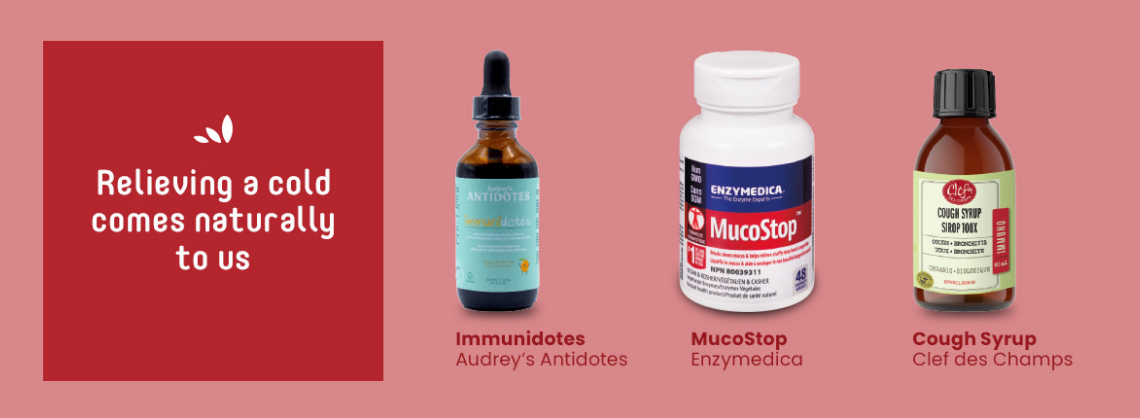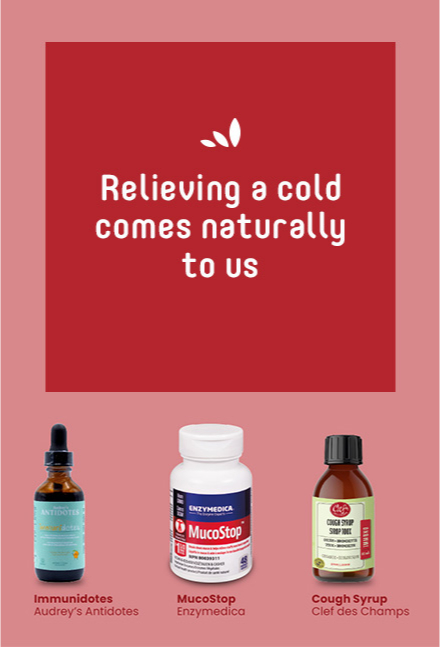Coughing, nasal, and bronchial congestion are common discomforts, especially during the cold seasons. Fortunately, nature is full of treasures that can help us find relief. Natural health products are valuable allies for supporting our immune system when facing these winter ailments. Since it can sometimes be challenging to navigate through the options, let’s explore a carefully selected range of products to make an informed choice.


To choose the right product for your needs, it is important to understand their effects on your respiratory system:
- Decongestants help reduce swelling and mucus production in the airways, especially in the nose, allowing for easier breathing.
- Mucolytics act on the mucus, making it less thick and easier to expel. Mucolytics are particularly useful in cases of productive cough or bronchial congestion.
- Expectorants facilitate the expulsion of mucus from the airways by stimulating the glands that produce mucus or by encouraging bronchial muscle contractions. These are useful for clearing the lungs and bronchi.
Nasal Congestion
Nasal congestion, often caused by a cold, allergies, or environmental irritants, can quickly become uncomfortable. However, there are natural and effective solutions to alleviate this issue.
Steam inhalations with essential oils to quickly clear the airways:
- Eucalyptus radiata: A natural decongestant that helps thin mucus.
- Peppermint: Refreshing and soothing for inflammation.
- Ravintsara: A potent antiviral that supports immunity.
- Add 2 drops of each oil to a bowl of hot water. Cover your head with a towel and inhale deeply for 10 minutes.
- Saline nasal rinses
This practice cleans the airways, removes impurities, and reduces inflammation of the nasal mucosa. Use a saline spray or physiological serum 1-2 times per day until improvement.
- Ambient Aromatherapy
Diffusing essential oils in your home can help clear your airways while purifying the air of airborne germs. The combination of eucalyptus radiata and lemon is particularly effective.
Cough
Coughing is a common symptom of respiratory infections. The first step is to soothe any dryness or thin the mucus to aid its expulsion.
- Coniferous trees from Quebec, known for their expectorant and mucolytic properties, are especially useful in these cases. Prepared syrups of balsam fir, red spruce, and American ground pine are available to reduce these discomforts.
- Other syrup complexes combine elderberries with propolis for their antibacterial, antiviral, and fluidizing effects. This type of syrup helps reduce inflammation in the throat mucosa and also decreases cough caused by secretions, clearing the airways. Take one tablespoon several times a day, following the product’s instructions.
- There are also balsam fir lozenges, which may or may not be combined with antimicrobial plants such as thyme or echinacea. The salivation triggered by sucking on a lozenge helps limit coughing, while the properties of fir, thyme, and/or echinacea locally reduce irritation and mucus.
Herbal teas remain a great alternative to thin the mucus causing the cough while hydrating the throat in case of a dry cough. Consider infusions of thyme, eucalyptus, or peppermint.
- Steep a tea bag or one tablespoon of these herbs in hot water for 10 minutes. Add a teaspoon of honey to soothe throat inflammation and drink 2-3 times a day.
Bronchial Congestion
When cold weather attacks the bronchi, it’s helpful to act both locally and internally to aid the expulsion of the secretions causing the congestion.
- Tinctures (plant extracts prepared in alcohol or glycerin) are ideal for benefiting from the active properties of plants with just a few drops. While tinctures are often sold by individual plant, there are blends that combine multiple plants into one bottle. Echinacea, licorice, marshmallow, and propolis work together to soothe inflammation, stimulate the immune system, and support better mucus expulsion. The tincture can be easily taken multiple times a day in a glass of water.
Massaging the chest with essential oils that are antibacterial, antiviral, fluidizing, and expectorant can be a real advantage. A pre-blended complex containing essential oils of eucalyptus globulus, peppermint, and pine can relieve bronchial and pulmonary congestion associated with winter infections.
- Massage the chest with these diluted essential oils 4-5 times a day to feel their beneficial effects.
Precautions to Keep in Mind
Although natural products are generally safe, a few precautions are necessary:
- Respect dosages: Especially with essential oils, which can be irritating or toxic in high doses.
- Avoid certain products for children: Essential oils like peppermint or eucalyptus globulus are contraindicated for young children.
- Be mindful of allergies: Always test a product before using it for the first time, especially if you have sensitivities.
- Consult a professional: If symptoms persist or if you are pregnant, breastfeeding, or taking medication, consult your doctor.
Feel free to seek advice from the experts at Rachelle Béry.
In Summary
Nature offers a wide range of solutions for alleviating winter ailments. Tinctures, syrups, lozenges, herbal teas, and essential oils are all effective tools to target these discomforts while caring for your body in a more natural way. Depending on your needs, you’ll be better equipped to choose the most suitable products. And in case of doubt, don’t hesitate to ask for advice in-store.
Finally, remember that these solutions should be accompanied by rest, good hydration, and a balanced diet for a speedy recovery.
Delphine Kubica, Naturopath graduated from ESNQ
Higher Education School of Naturopathy of Quebec
The health and medical information published or presented in this article is the opinion of the author only and should not be used as a substitute for professional medical advice. Readers should use their judgment. It is their responsibility to independently verify the information provided in the article. The contents of this article are for discussion and informative purposes only and should never be used as a substitute for professional medical advice, diagnosis, or treatment. A medical professional is the only person who can evaluate your health and give you advice following a medical examination. Rachelle Béry will not be liable for any of the information presented in this article or in any associated links, nor the use or misuse of the information.
Sources and references:
Traité d’aromathérapie scientifique et médicale – Les Huiles essentielles
De Michel Faucon aux Éditions Sang de la Terre
Eucalyptus Radiata : p521
Eucalyptus globulus : p518
Cinnamomum camphora: p429
Mentha x piperita: p639
Citrus limonum: p468
Pinus sylvestris: p721
Elderberries—A Source of Bioactive Compounds with Antiviral Action
Mirela Lăcrămioara Mocanu and Sonia Amariei
Faculty of Food Engineering, Stefan cel Mare University of Suceava, 720229 Suceava, Romania (2022)
Antibacterial Properties of Propolis
Izabela Przybyłek andTomasz M. Karpiński
Department of Medical Microbiology, Poznań University of Medical Sciences, Wieniawskiego 3, 61-712 Poznań, Poland
DOI: 10.3390/molecules24112047
Echinacea purpurea: Biological and Pharmacological Properties. A Review
by Cristina Burlou-Nagy, Florin Bănică, Tünde Jurca, Laura Grațiela Vicaș, Eleonora Marian, Mariana Eugenia Muresan, Ildikó Bácskay,Rita Kiss,Pálma Fehér and Annamaria Pallag.
University of Oradea, Romania and University of Debrecen, Hungary.ß
The evidence of health benefits and food applications of Thymus vulgaris.
Ana Sanches Silva, Devesh Tewari, Antoni Sureda, Ipek Suntar, Tarun Belwal, Maurizio Battino, Seyed M. Nabavi, Seyed F. Nabavi.
Trends in Food Science & Technology – Volume 117, November 2021, Pages 218-227
Chemistry, Biological Activities, and Uses of Balsams
Aguiar, A.T.C., Barcellos-Silva, IG.C., de Oliveira Habib-Pereira, N.R., Antonio, A.S., da Veiga-Junior, V.F. (2022).
Gums, Resins and Latexes of Plant Origin. Reference Series in Phytochemistry. Springer, Cham. p399–432
DOI: 10.1007/978-3-030-91378-6_20
Licorice (Glycyrrhiza glabra L.) Medication in Human Health
Muhammad Arshad Ullah, Ali Hassan and Ameer Hamza
Journal of Traditional Medicine & Applications (2024)
Marsh Mallow (Althaea officinalis L.) and Its Potency in the Treatment of Cough
Mohaddese Mahboubi
Complement Medicine Research (2020) 27 (3): p174–183.

